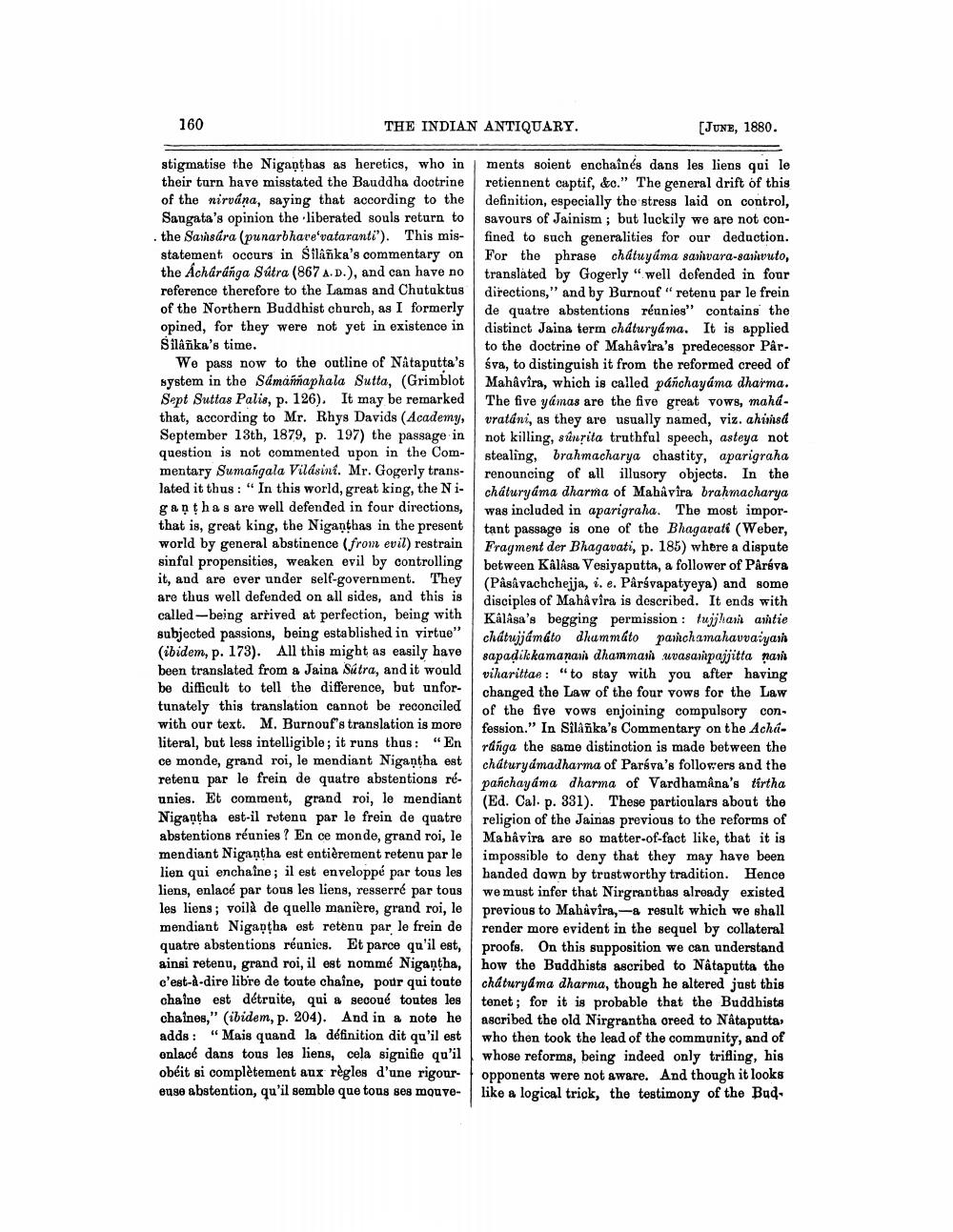________________
160
THE INDIAN ANTIQUARY.
[JUNE, 1880.
stigmatise the Nigantbas as heretics, who in ments soient enchaînés dans les liens qui le their turn have misstated the Bauddha doctrine retiennent captif, &c." The general drift of this of the nirvana, saying that according to the definition, especially the stress laid on control, Sangata's opinion the liberated souls return to savours of Jainism ; but luckily we are not conthe Sarisdra (punarbhare'vataranti). This mis- fined to such generalities for our deduction. statement occurs in Silanka's commentary on For the phrase chátuyáma sariwara-sariwuto, the Acháránga Sútra (867 A.D.), and can have no translated by Gogerly "well defended in four reference therefore to the Lamas and Chutaktus directions," and by Burnout "retenu par le frein of the Northern Buddhist church, as I formerly de quatre abstentions réunies" contains the opined, for they were not yet in existence in distinct Jaina term cháturyáma. It is applied Siláñka's time.
to the doctrine of Mahavira's predecessor Pår. We pass now to the outline of Nataputta's śva, to distinguish it from the reformed creed of system in the Samaññaphala Sutta, (Grimblot Mahâvîra, which is called panchayáma dharma. Sept Suttas Palis, p. 126). It may be remarked The five yamas are the five great vows, mahathat, according to Mr. Rhys Davids (Academy, vratáni, as they are usually named, viz. ahissa September 13th, 1879, p. 197) the passage in not killing, súnrita truthful speech, asteya not question is not commented upon in the Com- stealing, brahmacharya chastity, aparigraha mentary Sumangala Vildsini. Mr. Gogerly trans
renouncing of all illusory objects. In the lated it thus: "In this world, great king, the Ni- chaturyáma dharma of Mahậvira brahmacharya gan tha s are well defended in four directions, was included in aparigraha. The most importhat is, great king, the Niganthas in the present
tant passage is one of the Bhagavall (Weber, world by general abstinence (from evil) restrain
Fragment der Bhagavati, p. 185) whore a dispute sinfal propensities, weaken evil by controlling
between Kalasa Vesiyaputta, a follower of PAréva it, and are ever under self-government. They
(Påsavachchejja, i. e. Pârávapatyeya) and some are thus well defunded on all sides, and this is
disciples of Mahavira is described. It ends with called - being arrived at perfection, being with Kálása's begging permission : Tujhan anhtie subjected passions, being established in virtue"
chatujjámáto dhummato panichamahavvaiyasi (ibidem, p. 173). All this might as easily have sapadikkamanani dhammash wasanipajjitta pani been translated from a Jaina Sútra, and it would
viharittae : "to stay with you after having be difficult to tell the difference, but unfor
changed the Law of the four vows for the Law tunately this translation cannot be reconciled
of the five vows enjoining compulsory conwith our text. M. Burnouf's translation is more fession." In Silanka's Commentary on the Achiliteral, but less intelligible; it runs thus: "En
I ranga the same distinction is made between the ce monde, grand roi, le mendiant Nigantha est cháturyámadharma of Parsva's followers and the retenu par le frein de quatre abstentions ré- panchayáma dharma of Vardhamana's tirtha unies. Et comment, grand roi, le mendiant (Ed. Cal. p. 331). These particulars about the Nigantha est-il retenu par le frein de quatre religion of the Jainas previous to the reforms of abstentions réunies ? En ce monde, grand roi, le Mahavira are so matter-of-fact like, that it is mendiant Nigantha est entièrement retenu par le impossible to deny that they may have been lien qui enchaîne; il est enveloppé par tous les handed down by trustworthy tradition. Hence liens, enlacé par tous les liens, resserré par tous we must infer that Nirgrapthas already existed les liens; voilà de quelle manière, grand roi, le previous to Mahavira,-& result which we shall mendiant Niganţha est retenu par le frein de render more evident in the sequel by collateral quatre abstentions réunics. Et parce qu'il est, proofs. On this gnnnorition we can understand ainsi retenu, grand roi, il est nommé Nigantha, how the Buddhists ascribed to Nâtaputta the c'est-d-dire libre de toute chaîne, pour qui toute cháturya ma dharma, though he altered just this chaine est détruite, qui a secoué toutes les tenet; for it is probable that the Buddhista chaines," (ibidem, p. 204). And in a note he ascribed the old Nirgrantha creed to Nataputta, adds: "Mais quand la définition dit qu'il est who then took the lead of the community, and of onlacé dans tous les liens, cela signifie qu'il whose reforms, being indeed only trifling, his obéit si complètement aux règles d'une rigour opponents were not aware. And though it looks euge abstention, qu'il semble que tous ses mouve- like a logical trick, the testimony of the Bud.




